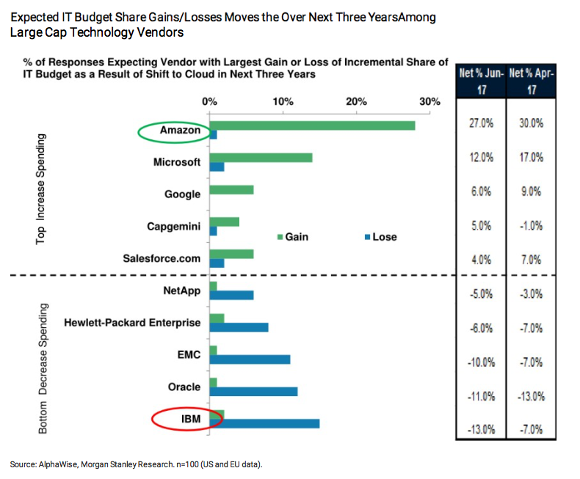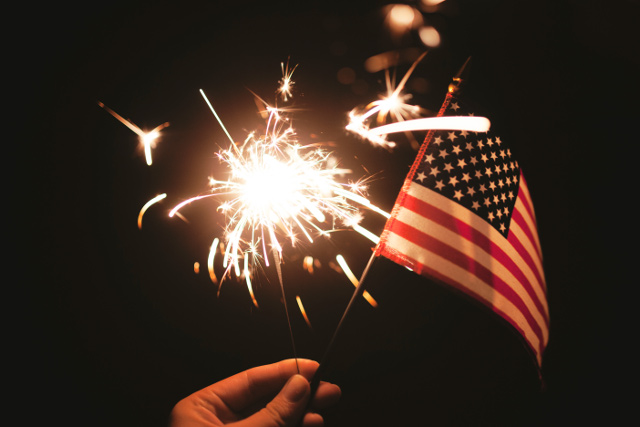
Microsoft is looking to reduce their sales force by 3000 heads in order to streamline cloud sales. Several reports are stating that this is not a cost cutting move by Microsoft, but rather a refocus.
Some news outlets are questioning IBM’s understanding of potential problems widespread AI implementation could cause. IBM’s position of AI acting as job-enhancers instead of an instrument of elimination is coming under fire.
More stories of inappropriate behavior of Silicon Valley leadership are making the news. It this really a systematic cultural issue or perception caused by a handful of bad people?
Acquisitions
- Baidu acquires natural language startup Kitt.ai, maker of chatbot engine ChatFlow
China’s search giant Baidu has made another acquisition to continue its push into artificial intelligence, and specifically to help it carve out a place for itself as a platform for developers who want to create chatbots and other services based on natural language technology.
Baidu has acquired Kitt.ai, a profitable startup based out of Seattle that has developed a framework to build and power chatbots and voice-based applications across multiple platforms and devices (presumably named after this Kitt).
https://techcrunch.com/2017/07/05/baidu-acquires-natural-language-startup-kitt-ai-maker-of-chatbot-engine-chatflow/
Baidu forms global alliance to accelerate AI adoption in self-driving carsRather than produce self-driving cars itself, Baidu is banking on the open-source platform to “export its technology capability and integrate resources” for a “win-win situation” as artificial intelligence is set to reshape the entire car manufacturing industry, said Lu Qi, chief operating officer of the Nasdaq-listed Baidu.
- Cisco is relieved the FTC stepped in to protect it from its competitor
The problem is Broadcom makes a lot of chips for all sorts of networking products, and one of its big customers is Cisco. Right from the start, Broadcom said it would sell off Broadcom’s general networking equipment business. It didn’t want to give the impression that it was competing with its customers. It wanted Brocade for its storage business.
But Cisco wasn’t exactly comfortable with that idea and the FTC agreed. Broadcom proposed one more restriction: it said it would also “firewall off” the chip-making unit working with Cisco products from Brocade. It agreed that any information about the chips it manufacturers for Cisco cannot somehow find their way into the hands of the Brocade unit, to be used to compete against Cisco.
http://www.businessinsider.com/cisco-happy-ftc-will-limit-broadcom-with-brocade-2017-7
- Forrester: Apple Should Buy IBM (LMAO)
A critical weapon in this war is natural language processing, a form of artificial intelligence. NLP enables machines to accurately understand the human voice, make sense of personal requests, and form credible answers. Amazon leads with Alexa, Google is a close second with Google Home, and Microsoft’s entry is Cortana. Apple’s perpetually annoying and undependable Siri has fallen behind.
Artificial Intelligence
- IBM Is Clueless About AI Risks
“The crux of its argument is that IBM knows more about AI and about economics than the ‘fearful prophets’ and that any mention of risks is a dangerous, Luddite fallacy,” said Russell.
On the economics of employment risks, Russell pointed to several “fearful prophets,” including Nobel laureates Robert Shiller, Mike Spence, and Paul Krugman; Klaus Schwab, head of the World Economic Forum; and Larry Summers, former Chief Economist of the World Bank and Treasury Secretary under Bill Clinton. “I don’t think one can dismiss their arguments with ad hominem insults,” said Russell. As these thinkers have taken great pains to point out, the pending automation revolution is poised to eliminate countless jobs and displace workers.
http://gizmodo.com/ibm-is-clueless-about-ai-risks-1796549532

- Why old tech is scarier than Hollywood AI
“We have the sci-fi depictions of sentient networks that will turn against us, but the problem is, we’ve already built something way too complex for us to be able to manage as a society,” according to Wendy Nather, principal security strategist at Duo Security. “This is a very shaky foundation that we have to clean out and redo.”
- Salesforce ‘Einstein’ AI can tell when people are angry in texts and emails
The Einstein Intent tool allows programmers to understand the intent of customer inquiries, which could make it easier to automatically route leads, escalate service cases or personalize a marketing campaign through a custom app. This could be particularly useful for prioritizing customer service inquiries.
Traditional keyword-based tools have trouble with complex wording or sarcasm, but this tool is designed to deal with these.
http://www.netimperative.com/2017/07/salesforce-einstein-ai-can-tell-people-angry-texts-emails/

Cloud
- Microsoft reorganizing its sales organization around cloud strategy
Bloomberg reported Friday that Microsoft will cut some jobs and move others around in a reorganization directly impacting two separate divisions of the company. The Worldwide Commercial Business group, led by Judson Althoff, and the global sales and marketing group, led by Jean-Philippe Courtois, will be affected by moves that Bloomberg called “some of the most significant in the sales force in years.”
https://www.geekwire.com/2017/report-microsoft-reorganizing-sales-organization-around-cloud-strategy/
WSJ cuts right to the point: Microsoft to Cut Sales Jobs Next WeekThe exact number of layoffs is unclear, though they will hit staff in offices around the world, this person said. Microsoft more than 121,000 employees at the end of March, the last time the company disclosed its head count.
https://www.wsj.com/articles/microsoft-to-cut-sales-jobs-next-week-1498866092
Microsoft plans up to 3,000 job cuts in a sales staff overhaul to fuel cloud growthThe job cuts amount to less that 10 percent of the company’s total sales force, and about 75 percent of them will be outside the U.S., the company said.
“Microsoft is implementing changes to better serve our customers and partners,” a Microsoft spokesperson told CNBC. “Today, we are taking steps to notify some employees that their jobs are under consideration or that their positions will be eliminated. Like all companies, we evaluate our business on a regular basis. This can result in increased investment in some places and, from time-to-time, re-deployment in others.”
http://www.cnbc.com/2017/07/06/microsoft-will-layoff-thousands-of-employees.html
- This chart shows how painful the shift to cloud computing is for IBM and Oracle
The two technology vendors are set to lose out considerably in IT budgets over the next three years as the result of the shift to cloud, according to the June AlphaWise/Morgan Stanley CIO report. CIOs expect that 46% of their workloads will be in the cloud by the end of 2020, while only 34% will be on-premise.
Between now and then, the 100 US and European CIOs surveyed expect to decrease spending on IBM by 13%, and to decrease spending on Oracle by 11%.
Other
- Europe Is Becoming a Bigger Problem for Silicon Valley
Just Friday, Germany approved new legislation imposing €50 million fines on social-media companies that fail to quickly remove hate speech and terrorist content—over strident opposition from Facebook Inc. and other tech companies, which advocate self-regulation to tackle those problems. That step followed the €2.42 billion ($2.76 billion) fine that the European Union’s executive arm levied this week against Alphabet Inc.’s Google for abusing its dominance as a search engine.
Also
One factor in the policing has been tech firms’ disruption of traditional industrial giants in Europe. In response, many legacy players have lobbied for new rules and tougher enforcement against the interlopers—and found open ears. European telecom firms, angry about seeing their revenue from text messages undercut by chat apps, were among the first to advocate new legislation to mandate a “level playing field.”
https://www.wsj.com/articles/europe-is-becoming-a-bigger-problem-for-silicon-valley-1498849603
- Amazon Plans to Join Red Hat and GE in Boston’s Hottest Tech Hub
Seattle-based Amazon, a giant in retail and cloud computing, will take 150,000 square feet former warehouse right by the Fort Point Channel, which separates Boston from South Boston, according to the report.
This week, Red Hat (RHAT) officially launched a new engineering lab and briefing center in South Boston. And part of the reason Progress Software bought Kinvey, an application development specialist, is to use that company as a downtown Boston center. Progress, itself, is based in the Boston suburbs.
- Dave McClure resigns as general partner of 500 Startups funds
Dave McClure has resigned as a general partner of all funds and entities managed by 500 Startups, the seed investment group he founded in 2010, Axios has learned. The move comes after several women accused McClure of inappropriate behavior.
https://www.axios.com/exclusive-dave-mcclure-resigns-as-general-partner-of-500-startups-2452701900.html
McClure: I’m a Creep. I’m Sorry.I made advances towards multiple women in work-related situations, where it was clearly inappropriate. I put people in compromising and inappropriate situations, and I selfishly took advantage of those situations where I should have known better. My behavior was inexcusable and wrong.
- Samsung Reduces Its Global Workforce Due To Restructuring
Samsung, one of the largest electronics company in the world, was forced to reduce its global workforce due to the restructuring of its business operations in China, based on company data. The data shows that the electronics giant has reduced the number of its employees in 2016 by 5.2 percent, from 325,677 down to 308,745. In its South Korean home base, Samsung has cut down its workforce by 3.8 percent and is now down to 93,204 while it slashed the number of its employees abroad by 5.8 percent and is now currently 215,541. It was in China where the largest workforce reduction was implemented in 2016 where the labor force was slashed down by 17.5 percent and is now down to just 37, 070. However, the North and South American workforce experienced an increase in employee numbers by 8.5 percent, and now count 25,988 employees.
https://www.androidheadlines.com/2017/07/samsung-reduces-global-workforce-due-restructuring.html
Photo: Alexandre Chambon















